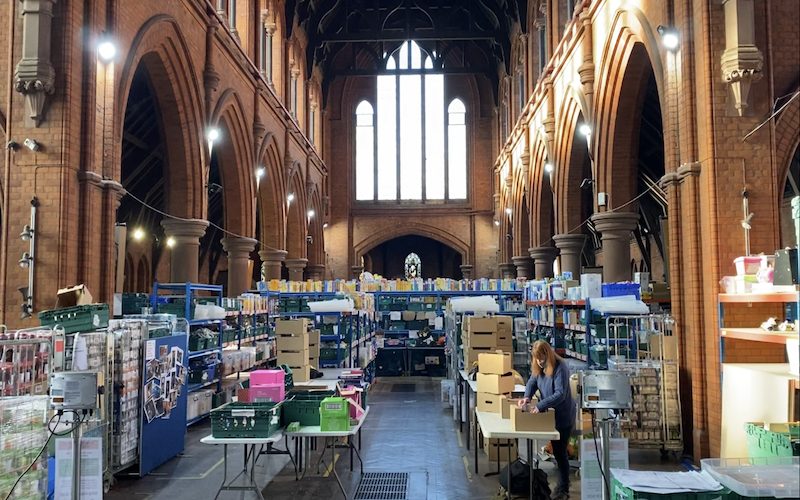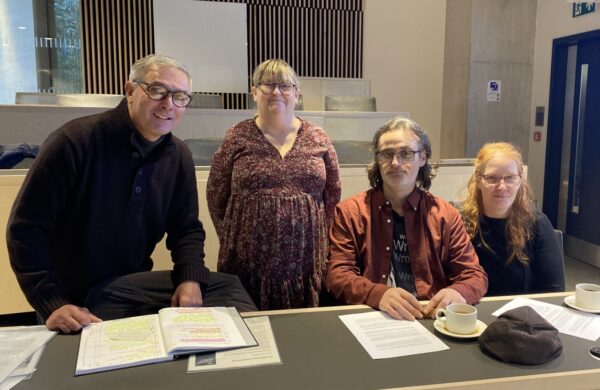We need to dig deeper in our response to poverty
In this guest blog, theologian Greg Smith challenges churches to find their prophetic anger.

A recent article by Jo Moore on Grace + Truth highlighted a significant issue: that unconditional generosity can so easily lead to dependency for the recipient. Those of us who have been active in this kind of work recognise the sense of entitlement which easily develops in response to whatever welfare provision or charity that is offered.
Christian professionals and campaigners in the poverty and development industry have long recognised that generosity is not enough. The arguments are well rehearsed in the context of international aid in Corbet and Finkett’s book When Helping Hurts.
Strong reaction
But Jo’s article also provoked a strong reaction in me. My own church, alongside other faith and community groups and our council, is deeply involved in this ministry. Personally I spend many hours in supporting and organising such work.
We are one example of the hundreds of churches, mosques and community groups who have been eager to respond to the urgent needs of people struggling with poverty and a precarious life. In recent years, over 2,500 food banks have been established. And now, in response to the current cost of living crisis, thousands of ‘warm welcome centres’ have opened too.
While these initiatives provide essential first aid to people in crisis, and may even save lives, they remain problematic.
Digging deeper
Jo is right to dig deeper in trying to find out what kind of help can make a significant and real difference to people’s lives, so that they can move beyond the crisis of an empty larder.
So in her (as in most other) food banks, customers are asked some questions, and attempts are made to address underlying issues. If the questions are asked sensitively and if there are good referral pathways to other agencies who can help with issues such as employment, debt, addictions and domestic violence, much good can be done.
Transactional
However, the key to success is building long-term relationships of trust. Mutuality always trumps charity.
Sadly, the model of the food bank industry is fundamentally a welfare-client transaction conditional on a referral from an organisation that holds power. This is simply not well fitted to building relationships of solidarity and providing personal dignity. Improved models of delivering food aid are emerging, such as food co-operatives, pay-as-you-feel markets, and Local Pantries.
Transforming relationships
But there is also a strong case that anti-poverty work is most effective if located, not so much in projects and para-church organisations, but in the gospel and local churches that are deeply rooted in the life of economically struggling local communities. Here it is that deep, honest and life-transforming relationships can best be built.
The case is well and passionately argued in Mez McConnell’s The Least, The Last and the Lost (see my review).
Burden on individual
Jo’s questioning of people who visit the food bank seems to place a great burden on the individual, and to locate the causes of poverty firmly in personal behaviour and attitudes. A survey for The Evangelical Alliance in 2015 (p14-15) demonstrated that this interpretation of UK poverty is almost universal among Christians. In my view this is misguided and can become a dangerous form of victim blaming.
We need to have more understanding and sympathy for the complex factors which underlie the struggles people face as they confront economic disadvantage. These include family and social class background, where they live, educational disadvantage, poor housing, health and disability issues, trauma from violence and abuse, and powerlessness against the system. Structural injustice and growing inequality are problems around the globe which cannot be ignored.
Going upstream
Therefore we need to go upstream, to investigate underlying causes of poverty and injustice to bring prophetic words and campaign for political change. We need holistic analysis and a programme of action on multiple fronts.
We can take inspiration from my friend Bob Holman (if you don’t know of him do follow the link), who combined Christian integrity, compassionate community work and a structural and political analysis of poverty. His approach shows how Christians really can be good news to individuals, our communities and our country.
Personal responsibility
This does not mean we can deny individual agency and personal responsibility, for that is central to the human condition. People created by God and placed in society are moral beings. It is often right to challenge people with a word of ‘tough love’. Darren McGarvey, an expert in the field by lived experience, has explored this brilliantly in his books such as Poverty Safari and his recent Reith Lecture.
In short, Christians we need to go beyond the charity of food banks. We need to build honest relationships in community and work alongside people who come presenting a need. But we also need to raise our voice to change the inequality and injustice that has led to the rapid rise of so many services providing for basic needs. We need a prophetic anger about why we are even in this situation in the first place.
This article first appeared on the Grace + Truth blog and is reproduced by permission.
Greg Smith lives in Preston, Lancashire and enjoys an active retirement following 40 years of urban church and community work. He is an honorary associate research fellow with the William Temple Foundation.


Comments (01)
Comments are closed.